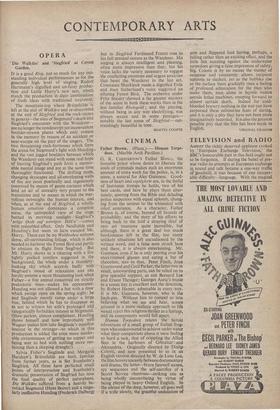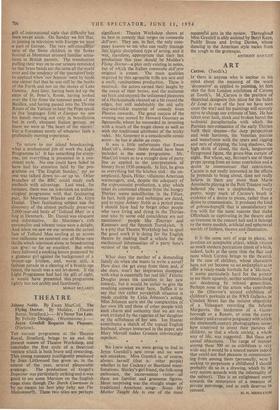TELEVISION and RADIO AMIDST the richly deserved applause evoked by
'European Exchange Television,' the BBC's honourable past in this field ought not to be forgotten. If during the babel of pre- war radio its attempts at European exchange in sound and talk became a one-way traffic of goodwill, it was because of one insuper- able difficulty—language. With the magical gift of international sight that difficulty has been swept aside. On Sunday we felt that, in joining in television with Europe we were a part of Europe. The very self-consans- ness of the Swiss children in the floWrer festival at Montreux aroused familiar sensa- tions in British parents. The trombonists puffing their way on to our screens reminded us that brass bands are the same all the world over and the tendency of the spectator-only to applaud when 'oor Jeannie' went by made one viewer feel that he was still by the banks of the Forth and not on the shores of Lake Geneva. And later, having been led up the steps of St. Peter's, Rome, having looked over the City from the topmost peak of the Basilica, and having passed into the Throne Room of the Vatican to hear the Pope speak in five languages Urbi et Europae we saw his hands moving not only in benediction but in swift, eloquent Italian gesture, we knew we were at 'the heart of the matter.' For a European surely of whatever faith a profoundly moving experience.
• To return to our island broadcasting, what a professional job of work the Light Programme is It has something for every- one, yet everything is presented in a con- sistent style. No one could have failed to have had his attention held by the pro- gramme on 'The English Sunday,' yet no one was talked down to—or up to. Other branches of the BBC could study such methods with advantage. Last week, for instance, there was on television an archae- ological programme with that fascinating pair, Sir Mortimer Wheeler and Dr. Glyn Daniel. Their fascinating subject was the discovery of the almost perfectly preserved 2,000-year-old body of `Tollund Man' in a bog in Denmark, Dr. Daniel was eloquent and informative. Sir Mortimer's rich personality and vibrant voice were a delight. And when we saw on our screens the actual face of Tollund Man smiling at us across two millennia we received one of those rare thrills which television alone in broadcasting can give: so far so excellent. But when there followed a cooking lesson presented by a glamour girl against the background of a bronze-age kitchen, and, worse still, a fashion parade in a clearing of a bronze-age forest, the result was a sad let-down. If the Light Programme had had the gift of sight, it would have presented this programme lightly but not archly and facetiously.
MORAY MC L AREN



































 Previous page
Previous page